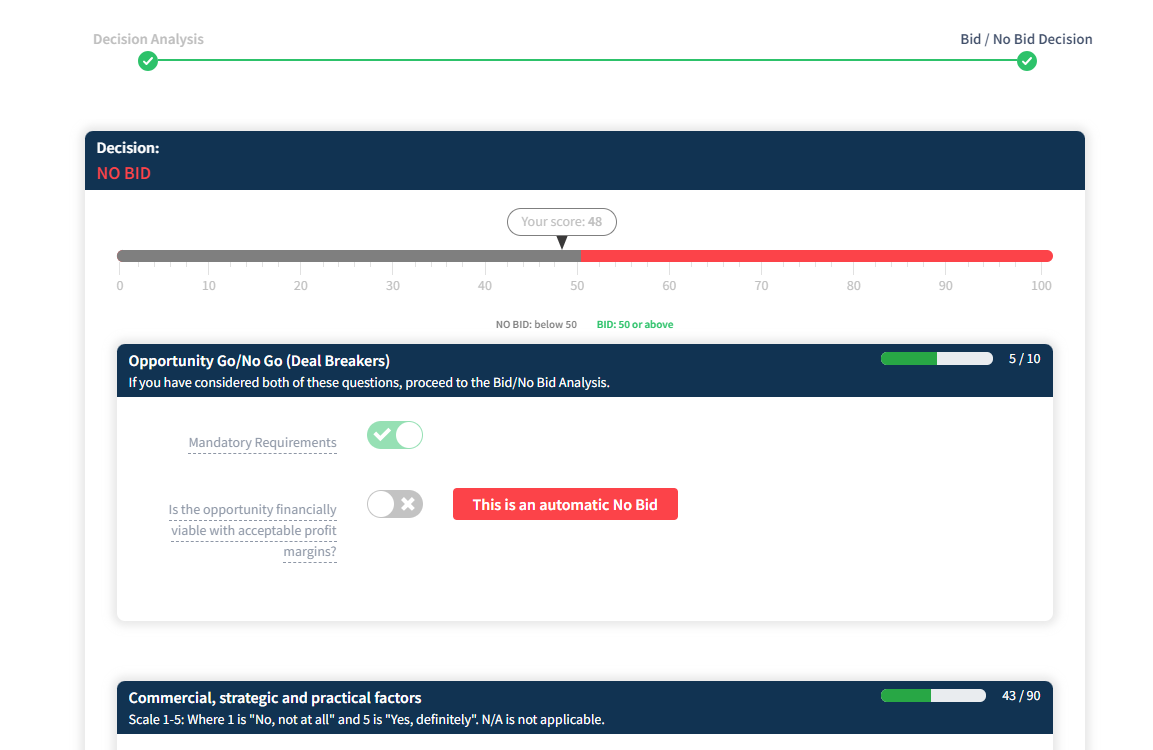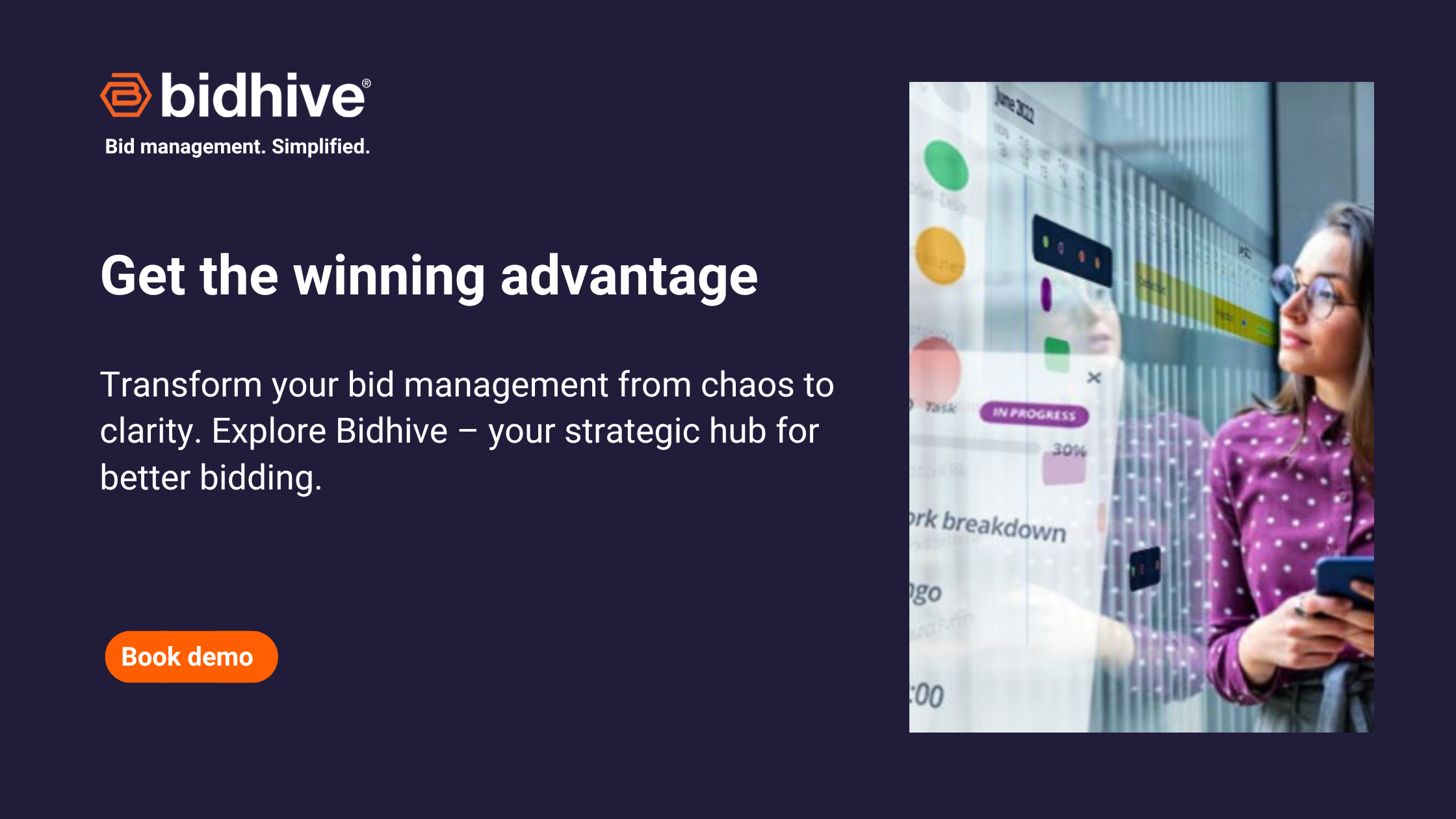In high-stakes competitive bidding, making informed and strategic decisions is paramount. Yet, very often, organisations (or shall we more specifically say bid teams) fall victim to pursuing nearly every bid opportunity that comes their way. This “bid for almost everything” mentality, often driven by executive directives, can lead to wasted resources, financial strain, and missed opportunities for more viable projects.
One powerful way to counteract this tendency and instill a disciplined, objective approach is by incorporating deal breakers into the Bid/No Bid decision process.
The role of deal breakers
Deal breakers serve as non-negotiable criteria that, when present, automatically disqualify an opportunity from further pursuit. These are the red flags that signal a fundamental mismatch between the bid requirements and the company’s capabilities, values, or strategic goals (even if you’re sitting in a favourable position with all other factors, the deal breakers will tip the decision). Establishing clear deal breakers ensures that the decision to bid is based on rational analysis rather than subjective enthusiasm or pressure from leadership.
Benefits of deal breakers
1. Enhancing objectivity and focus
Deal breakers act as a safeguard against the subjective inclination to chase every bid. By defining specific conditions that preclude bidding, companies can more objectively assess opportunities. This objectivity helps to focus resources on bids where the company truly has a competitive advantage, thereby increasing the win rate and optimising the use of resources.
2. Driving strategic alignment
Every company has a strategic roadmap that guides its business development efforts. Deal breakers ensure that bidding activities are aligned with this long-term strategy. When an opportunity does not fit within the strategic framework — whether due to location, contract size, or the nature of the work — it is automatically filtered out. This strategic alignment prevents the pursuit of bids that, while potentially lucrative in the short term, do not contribute to the company’s overall goals.
3. Optimising resource allocation
Pursuing every bid can drain an organisation’s resources, both financial and human. Deal breakers help conserve these resources by preventing investment in non-viable opportunities. This allows the company to channel its efforts into high-probability bids that are worth the investment, ultimately leading to more successful outcomes.
4. Ensuring financial prudence
One of the critical functions of deal breakers is to assess the financial viability of an opportunity. If a bid presents significant financial risks —such as low profit margins, high project costs, or potential for financial loss — it is automatically disqualified. This financial prudence protects the company from entering into unfavourable contracts that could jeopardise its financial health.
5. Supporting bid manager expertise
Bid managers are experienced professionals who understand the nuanced requirements of successful bidding. Deal breakers empower bid managers by providing a structured framework that supports their expertise. This framework helps to support data-driven decisions, which can be presented to executives as evidence-based recommendations. This not only reinforces the credibility of the bid manager but also helps in gaining executive buy-in for informed decisions.
6. Mitigating risk
Bidding on unsuitable opportunities can expose the company to various risks, including legal, financial, and reputational risks. Deal breakers serve as an early warning system, highlighting potential risks and ensuring that only bids which the company is well-positioned to execute are pursued.

Implementing deal breakers
For deal breakers to be effective, they must be well-defined, measurable, and relevant to the company’s operational and strategic context. Some common deal breakers include:
– Contract type and conditions: Does the contract fit our company’s capabilities and experience?
– Profitability: Is the opportunity financially viable with acceptable profit margins?
– Future opportunities: Does this bid align with our strategy for future growth?
– Technical know-how: Do we have the necessary expertise?
– Resourcing and capacity: Can we commit the required resources without jeopardising current projects?
By setting these criteria (and communicating the corporate-level requirements to your team), companies can objectively screen bids and make informed, strategic decisions.
Key takeaways
Incorporating deal breakers into the Bid/No Bid decision process is a strategic move that enhances objectivity, aligns efforts with long-term goals, and optimises resource allocation. It supports the expertise of bid managers and mitigates risks rather than succumbing to the allure of bidding for every possible opportunity. Through disciplined decision-making, companies can achieve sustainable growth and success in competitive bidding.


